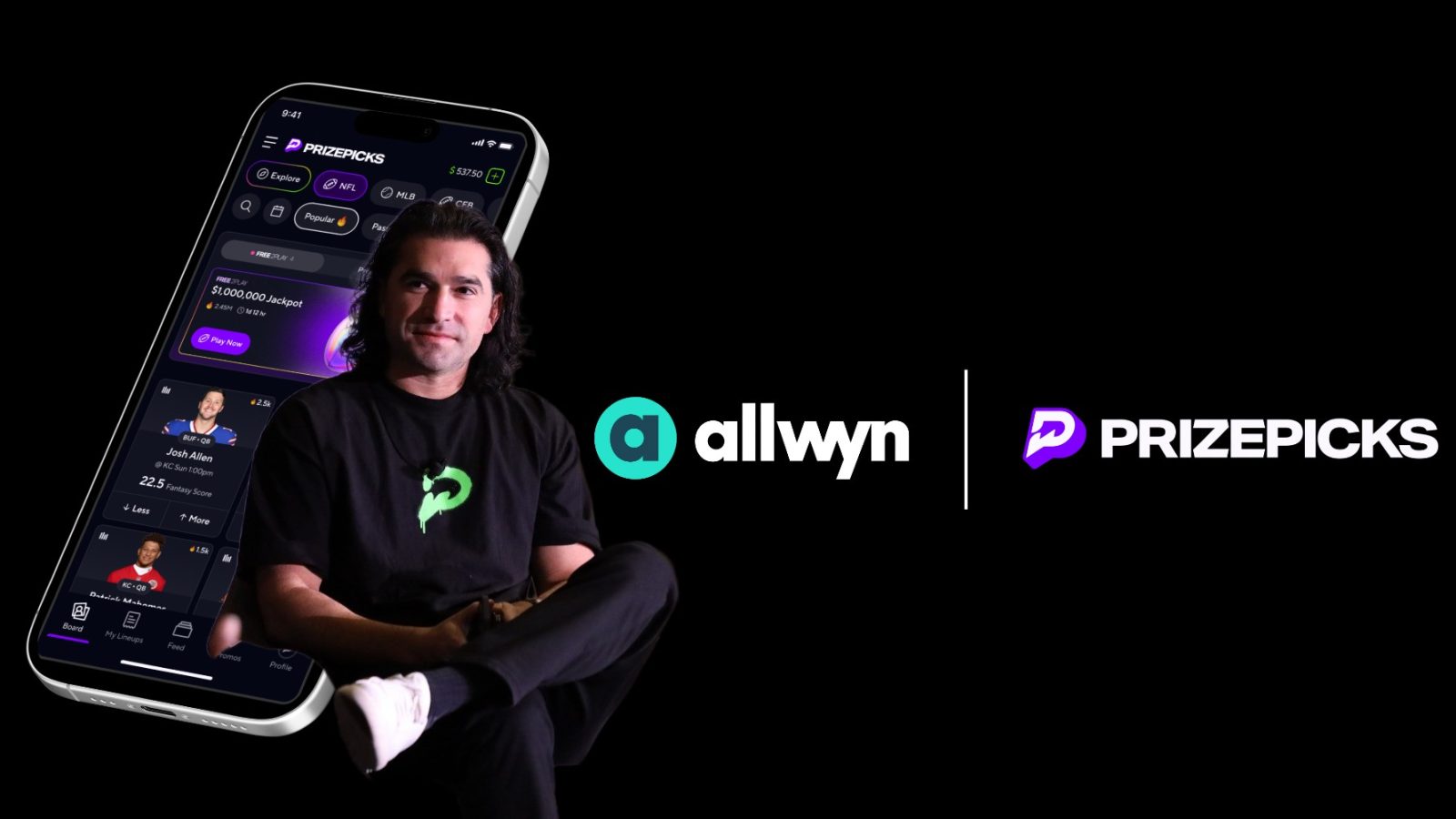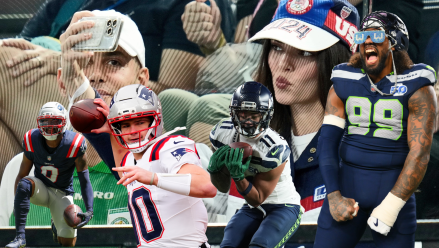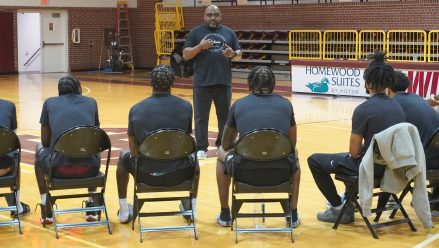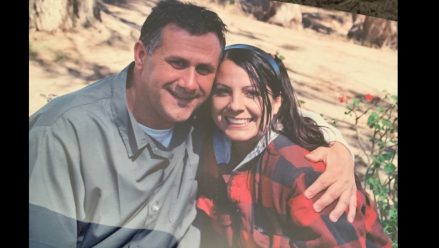Adam Wexler looked the part of a daily fantasy sports business founder and CEO turned executive chairman on Wednesday. Actually, to his knowledge, he’s the only one in the gaming industry, so he’s inventing the vibe as he goes along.
Jaunty in a PrizePicks cap positioned just right, the skyline of Buckhead — where he and Jay Deuskar founded the company in 2017 — framed by a window of his Atlanta office, Wexler seemed relaxed and invigorated on his company’s first not-newsy day this week.
Monday, PrizePicks announced that lottery purveyor Allwyn Entertainment would buy a 62.3% share of the company in a deal that pegged it at a $2.5 billion valuation. The PrizePicks management team will continue to hold the remaining 37.7%, and will continue to run the operation as an arm of Allwyn.
On Tuesday came the announcement that PrizePicks had been certified by the National Futures Association (NFA) as the first DFS company allowed to enter the emerging prediction markets fray as a Designated Contract Market (DCM). It will eventually do business as PrizePicks Predict.
Wexler deferred questions about the future of the company to Mike Ybarra, a former Blizzard Entertainment president who succeeded him as PrizePicks CEO in 2024. The move allowed Wexler to transition into a new role as executive chairman and away from the daily business of running a DFA company with more than 10 million community members. Wexler seemed eager, though, to detail how his startup had traversed so many obstacles and positioned itself for the next big thing — be that prediction markets or something else he concocts — with a passel of cash at the ready and time to think.
In an expansive interview with InGame, Wexler discussed a brisk Monday and Tuesday, online sportsbooks’ hypocrisy, and why the change suits him.
“There’s a very big difference between trying to be the CEO that’s going to lead by example Monday through Friday, 9-to-5, traditionally, and then being the founder and face, playing that role in the entertainment industry,” Wexler said. “And they’re often in conflict with each other, because one’s nights and weekends, the other’s kind of that Monday through Friday. And now it’s like I’ve got more of the flexibility to really kind of step out from the shadows and really be more of that founder face with many of our partners in the entertainment circuit.”
‘They hold us in very high regard’
InGame: What was the buzz around the building like this week with the two huge announcements?
Adam Wexler: I think the easier one for me to speak to is the Monday announcement.
The business has been ripping for a good while. I don’t think we were necessarily looking to sell the business per se. This is something that popped up organically.
I actually met Karel [Komarek] Jr. [the founder and chairman of Allwyn’s parent company] in 2020. And then I met [Allwyn Chief Investment Officer] Stepan [Dlouhy], who was on the deal a year later. These guys were always adamant, essentially saying, “We’re not doing any minority investments.”
It was always a majority investment with these guys. So when they popped up over the last year, I knew that was obviously a part of their criteria all along. I hope it’s pretty clear: They hold us in very high regard.
IG: How nimble does that cash infusion make you for the next PrizePicks move?
AW: I just think it can accelerate everything we want to do. We will have a lot more resources behind us going forward.
If we want to step on the gas, we can do that. If we want to expand into new jurisdictions, we can do that. There’s just a lot.
I think flexibility is probably the key word. Optionality, flexibility.
IG: Do you see similarities between the disruption and positioning in the gambling industry underway now to when you founded PrizePicks?
AW: I actually think there’s more parallels between [online sports betting] and prediction markets, except for one’s at the state level and one’s more at the federal level in terms of new categories emerging.
But they’re both tightly regulated spaces, whereas I think the irony is that DFS and maybe sweepstakes are a little more parallel in my mind with kind of where they are. Obviously, certain aspects of sweepstakes are coming under fire over the last year, more than others.
But with the change in the [presidential] administration almost a year ago and everything that’s ensued since then, I think every company in our space is probably at the very least having conversations around this topic and figuring out when or if things like this may slot on the roadmap.
IG: Don’t take this the wrong way … but what do you do in a day now?
AW: Totally get it. On that note, I’m not sure there’s anybody else in the industry that is an executive chairman, to my knowledge. You see this role in other industries.
The other side of my title is I’m the special advisor to the CEO. I just had my weekly one-on-one. Obviously, I’ve got 10 years of experience in this industry, so being able to just give him those downloads [is a positive].
The other thing I’d point out is Mike’s been here for about 15 months now, but this business has different considerations every single month. It’s very reliant on the sports calendar. He just did his first full trip around the sun.
Even though he was 11 months in in June, it didn’t mean that he knew what July was going to hold, necessarily. So just having people like me still around to guide him through those dark days of summer and, obviously, the prep into the next football season, I think can be helpful. But then to more directly answer your question, I’m still engaged with much of the C-suite in our executive leadership team.
Then I lean into certain areas where either we have gaps or are probably some of my strengths. So I think, for example, we only brought in a CMO [Mike Quigley], the first-ever CMO, during Super Bowl week. And so for multiple reasons, I was fairly leaned in on the marketing side of the house during the last football season.
Mike [Ybarra] is doing a phenomenal job, and he’s arguably better at business operations than me.
But I think the thing that’s always going to be near and dear to me is the brand. We’ve built up so much great brand equity over the years. I think it’s rooted in the fact that we are Atlanta-based, kind of Atlanta-rooted, Southern-focused, and we’ve leaned into a lot of things that are very closely associated with Atlanta, such as being the football capital of the world.
“Mike’s doing a phenomenal job, and he’s arguably better at business operations than me.”
IG: So you got to pivot to the fun stuff?
AW: Some would argue that. I don’t think Mike would argue that. I think he enjoys doing it.
The fun part to him is the business operations.
IG: Are you the type of advisor who wakes up with five ideas and starts texting Mike Ybarra?
AW: I wouldn’t say that. I’m trying not to be super disruptive like you just described. But I definitely have ideas that have never been tried in our space before.
I’ll try to chew on them, maybe, as opposed to shouting them out the first time they come to me. I try to talk to people and kind of vet them out a little bit before I actually come back and present something that sounds wild and crazy. I want to make sure I get the appropriate feedback up front.
IG: How well has DFS as an industry created a niche as online sports betting proliferated?
AW: Where we came from with this business and this product, it was originally intended to be an add-on to the season-long fantasy league experience just because that thing drags out for four, five, six months. Let’s chop it up and make it more exciting throughout the season.
I don’t think OSB was ever positioned as a solution like that. Naturally, as we got more and more centered around daily fantasy — as opposed to even weekly fantasy — we just tried to always keep it as simple as possible and get in, get out.
One thing I don’t think has been well written about in the press: The fact of the matter is fantasy’s always been focused around player predictions.
And OSB was, for the longest time, focused around team predictions and game results. You could argue that because of the success and the growth that was being experienced in this kind of new wave of DFS, OSB operators took notice. And it didn’t hurt that the leaders like FanDuel and DraftKings already had experience in the fantasy domain.
So they were more inclined to drag the rest of the OSB category into the player direction. And then all of a sudden, they oriented around [same-game parlays]. And from a legal standpoint, our legal requirements were always multiple players, multiple teams, accumulated statistics.
So we were always confined to offering things that were built around that. And then, SGPs come in and they claim what they’re doing is theirs. And I’m like, “Dude. Come on. We’ve been here for years now, and now you’re trying to tell me this is yours? Get out of here.”
IG: How crucial was the DFS+ industry coalescing around peer-to-peer games when pick ‘ems became contentious with states?
AW: The fact that FanDuel and DraftKings got into our category after years of arguably trying to antagonize our category was a big validation for DFS+ as a whole. It used to be that anything over/under, anything of that variety was OSB.
Well, then they kind of gave up on that, and then they basically settled on the argument being fantasy sports has to be peer-to-peer, and just to call it out, when these laws were drawn up that they spearheaded back in the middle of the last decade, there was only one state that said that fantasy sports had to involve multiple participants, and that was the state of Maine.
We knew that was a state where it was always a requirement to be peer-to-peer, but in all these other states, the common language was always centered around one or more participants.
So for years we operated our business off of that “one or more participants” kind of notion. But then, obviously, with the pressure that came from some of the competition and the fact that they were trying to impose their sentiment on the regulators, I think more recently, it’s kind of driven DFS+ toward more of a peer-to-peer variety.
But I think, based off of everything we’ve gathered about our peer-to-peer product, and we’ve kind of done it in waves, the economics have been pretty strong, and it just made sense not long ago to move the majority of our business in that direction.
IG: How concerning is California’s attorney general opinion that DFS is illegal gambling?
AW: California is its own beast. We obviously know there’s a lot of long-standing [gambling] tribes in the state.
It’s interesting that they were nowhere to be found during the last wave of DFS and the issues a decade ago, and then all of a sudden, here we are in 2025, and now it’s become an issue. We’ve been operating in California since we started PrizePicks in 2017. So it took eight years to become an issue.
It’s a bit strange to me, to be honest, but I know there’s a lot of encouraging dialogue that’s happening these days, and it’s not like we didn’t engage some of the tribes when we were coming up as a business. That’s the other kind of frustrating thing from my perspective, to be honest.
IG: What was the realistic expectation for PrizePicks when you founded it?
AW: I literally would say in 2018 and ‘19 when nobody really knew what was going on with DFS+ or pick’em, that there’s not a doubt in my mind this is going to be the biggest category in fantasy sports. And here we are, five, six years later, and it’s a surprise to many, but it was never a surprise to me.
I knew that the market was big enough.
I knew that a more straightforward, mainstream-accessible form of daily fantasy sports was going to be the winning formula. It was just a matter of time from my perspective. I wish some of the other operators didn’t try to antagonize the category for a while.
I wish they came in and just tried to compete out of the gates. But here we are, and I’m glad we’re through the worst of times.
I’ve always welcomed the competition.
IG: How many times were you tempted to sell before the Allwyn deal?
AW: When we’ve gone out to raise money in past years, a lot of investors and the like were always skittish about this business because of the regulatory concerns. And so it was less that in the earlier years.
I think the thing that maybe wasn’t fully understood about why we engaged [financial advisor Moelis & Company] back last summer right before I handed over the keys to Mike to run the show, was we had a couple inbound inquiries at that time and we needed to do our fiduciary duties to appropriately address them.
One thing led to another and here we are with the big announcement of this week.
IG: What’s next?
AW: Let’s just say I still have a lot of skin in the game going forward with this, despite this transaction that’s set to close before you know it. So it’s not like I will be going much of anywhere. I’ll still be quite active for a good while to come is what I’d say.
IG: Will you be cooking up the next vertical for the app?
AW: What’s exciting to me is there’s a lot of white space for us to play in. I think for the longest time we’ve been very centered and anchored around athlete predictions we’re able to fit within the fantasy sports requirements.
But I think we gave everyone a taste of what could go beyond that. Even just things as simple as what we did with our free-to-play product. Once you remove the real-money requirements, obviously there’s a lot more that you can do.
And so, for example, we did predictions around more or less where these guys are going to get drafted in the NFL Draft. It’s not an accumulated statistic prediction, so it actually would not fit as a fantasy sports prediction. But we could do that, obviously, with a free-to-play.
And then I think we went one step further. We said, “OK, what about over/under how many times is Mel Kiper going to say upside in the first round?” So now we’re just having fun with it and and we think it’s those kind of predictions that really start to enter us into a world in which we’ve always been with the brand.
I think we’ve never taken ourselves too seriously. And we’re just always kind of tapping into where culture is and what are the conversations.
IG: Will you eventually launch a sportsbook?
AW: We’re going to be a fantasy sports outlet for a while to come. But I think a lot of it really depends on if states like our home state of Georgia or Texas [legalize sports betting]. Then I think we’ve got a lot more motivation to really take seriously those considerations.
But to this day, it’s not on our roadmap.
IG: What would a Kalshi legal vindication do to the regulated sports betting industry in the United States?
AW: There’s a lot going on there. The topic of prediction markets, our current CEO, who came in right before the election cycle, that’s one that he’s been knee-deep on and obviously doing the diligence around to a much deeper degree than me.
Where my head is, is about continuing to think from a player-first mindset about how we continue to be these inventors of a game, that we are not trying to follow the playbook that anybody else has laid out.
We are building our own game and as long as we keep that player-first mindset for our existing game, there’s a lot more that we can do that is quite innovative and we think there’s still a lot more grass to capture and a lot more people to serve.
IG: Are you surprised about the rise of prediction markets and sports events contracts?
AW: I think surprise is maybe one way to put it. I did meet with [Polymarket CEO Shayne Coplan and Kalshi CEO Tarek Mansour] last year.
This is ahead of the election cycle, and I just felt like there was something there that could be interesting. With the new administration, I’m not surprised that it’s gotten a ton of momentum and is always in the news these days. It’s an interesting battle, relative to the federal and state considerations.
It’s a lot to keep up with, because once again, they’re always in the news.







